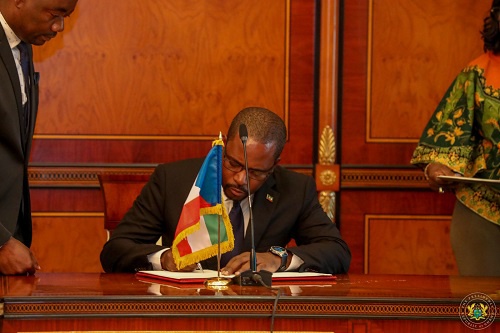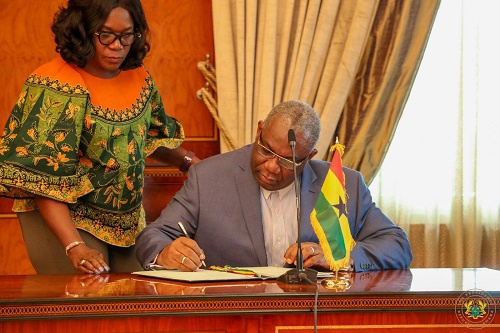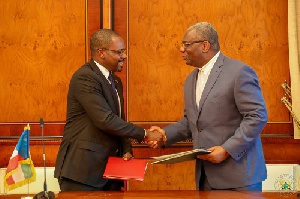Ghana has signed a Heads of Agreement with Equatorial Guinea for the supply of 150 million to 200 million standard cubic feet of gas per day of Liquefied Natural Gas (LNG), as part of the measures being put in place by the government of President Akufo-Addo to guarantee the country’s energy security.
The agreement was signed by Ghana’s Minister for Energy, Mr. Boakye Agyarko, and Mr. Gabriel Mbaga Obiang Lima, Minister of Mines, Industry, and Energy of Equatorial Guinea, and witnessed by President Akufo-Addo and President Teodoro Obiang Nguema Mbasogo.
Briefing journalists on arrival at the Jubilee Lounge of the Kotoka International Airport, Mr. Boakye Agyarko stated that there had been previous agreements entered into between the two countries that did not come into effect.
“But this time, we have been given the marching orders by both Presidents to make sure that by the end of 2017 the agreements (for the supply of LNG) come live. The significance of this gas supply is of the stable state of power generation in our country,” he said.
Ghana’s Energy Minister indicated that “for some time, we relied on Nigeria for the supply of gas from the Nigeria Gas Company, transmitted by the West Africa Gas Pipeline Company. The performance of that arrangement has been very unsatisfactory. Out of the 120 million standard cubic feet of gas per day, we receive, on a daily basis, on the best of days, only 30 million standard cubic feet of gas per day, which had a negative impact on our ability to generate power, using gas as its fuel stock.”
The arrangements with Equatorial Guinea, he added, however, will bring in LNG, which can be stored for 21 days and used accordingly to further improve Ghana’s power situation.

“Properly delivered, this will allow Asogli, for example, to expand its power production from 120 MW and scale up all the way to 580 MW. This will, to a very large extent, stabilise further the electricity generation, transmission and distribution that we have,” the Energy Minister stated.
He continued, “At the conclusion of the arrangement, it is our faithful expectation that gas, as a feedstock, instead of crude oil will be cheaper in terms of power production. This could mean that once the cost of producing electricity comes down, we will be in a further position to lower the user tariffs that our citizens pay for electricity.”

Boakye Agyarko described this as good news, stressing that “we are glad that under the President’s leadership and direction, we have been able to come thus far. The nation will begin to benefit from what has happened over this trip.”
Business News of Wednesday, 23 August 2017
Source: Flagstaff house













